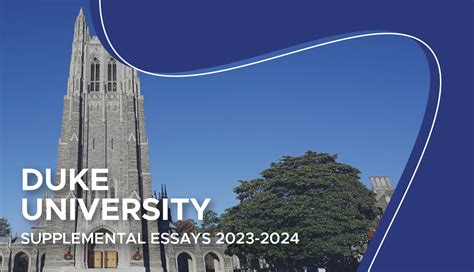The Duke Identity: A Tradition of Excellence
Duke University, consistently ranked among the top academic institutions globally, seeks individuals who embody its core values of intellectual curiosity, integrity, and service to the community. The “Why Duke” essay provides a pivotal opportunity for prospective students to articulate how they resonate with these ideals and why they believe Duke is the optimal environment for their academic and personal growth.

What the Admissions Committee Seeks
The admissions committee at Duke University carefully reviews each “Why Duke” essay, seeking to identify applicants who:
- Demonstrate a deep understanding of Duke’s mission and academic offerings. Passionately expressing why Duke’s specific academic programs, research opportunities, or extracurricular activities align with their interests and aspirations.
- Articulate a compelling narrative that highlights their unique qualities. Sharing personal experiences, values, and motivations that align with Duke’s commitment to fostering a diverse and inclusive community.
- Exemplify the DukeEngage spirit of service. Outlining experiences demonstrating a commitment to giving back to their local and global communities, reflecting Duke’s emphasis on global citizenship.
- Embrace Duke’s interdisciplinary approach. Expressing enthusiasm for Duke’s wide range of academic and extracurricular opportunities, showcasing a desire for intellectual exploration beyond traditional boundaries.
- Cultivate a sense of belonging. Articulating a genuine connection to Duke’s campus culture and its values of collaboration, innovation, and intellectual exchange.
A Framework for Crafting Your Essay
To craft a compelling “Why Duke” essay, consider the following framework:
- Begin with a Captivating Introduction: Start with a personal anecdote, thought-provoking question, or compelling statistic that captures the reader’s attention and introduces your key theme.
- Highlight Your Alignment with Duke’s Mission: Discuss specific programs, courses, or initiatives at Duke that align with your academic interests and career aspirations. Quantify your experiences with data and evidence whenever possible.
- Share Your Personal Narrative: Provide specific examples of your intellectual curiosity, integrity, and commitment to service. Use vivid language and anecdotes to bring your experiences to life and demonstrate your values.
- Emphasize Your Fit with Duke’s Community: Describe how your personality, perspectives, and extracurricular interests would contribute to Duke’s vibrant and diverse campus culture.
- Conclude with a Strong Call to Action: Reaffirm your enthusiasm for Duke and explain why you believe you would be an invaluable addition to the Duke community.
Effective Strategies for Success
- Research Thoroughly: Explore Duke’s website, attend virtual events, and connect with current students and alumni to gain a comprehensive understanding of the university’s culture and offerings.
- Be Authentic: Write from the heart and share your genuine experiences and motivations. Avoid generic statements or clichés that lack depth.
- Quantify Your Accomplishments: Use data and specific examples to support your claims. Quantifying your achievements adds credibility and impact to your writing.
- Proofread Carefully: Ensure your essay is free of grammatical errors, typos, and any inconsistencies. Seek feedback from a trusted mentor or English teacher to enhance clarity and readability.
Tips and Tricks for Perfection
- Start Early: Dedicate ample time to brainstorming, drafting, and revising your essay to ensure a polished final product.
- Seek Inspiration: Attend writing workshops, read examples of successful essays, and engage in thought exercises to spark ideas.
- Tell a Compelling Story: Use vivid language, anecdotes, and personal insights to make your essay memorable and engaging.
- Show, Don’t Tell: Instead of simply stating your qualities, provide concrete examples that demonstrate your skills, values, and experiences.
Common Mistakes to Avoid
- Generic Responses: Avoid using boilerplate language or repeating information found elsewhere in your application.
- Lack of Specificity: Provide specific details about your interests and how Duke aligns with your goals. Vague statements lack impact.
- Exaggeration or Fabrication: Represent yourself honestly and avoid embellishing your accomplishments or experiences.
- Unpolished Writing: Ensure your essay is free of errors, inconsistencies, and awkward phrasing.
- Ignoring Duke’s Values: Tailor your essay to Duke’s specific attributes and avoid rambling about general topics that could apply to any university.
Duke University at a Glance
- Rank: Consistently ranked among the top 10 universities in the United States by U.S. News & World Report.
- Admissions Rate: Approximately 7.1% for the Class of 2026.
- Student Body: Over 16,000 undergraduate and graduate students from all 50 states and more than 100 countries.
- Faculty: World-renowned faculty with expertise in a wide range of disciplines.
- Research: Over $1.2 billion in annual research expenditures, supported by 13 world-class research institutes and centers.
- Global Engagement: Partnerships with universities and organizations around the world, offering global study and research opportunities for students.
Tables for Reference
Table 1: Duke University Rankings
| Ranking Organization | Rank |
|---|---|
| U.S. News & World Report | 9 |
| The Princeton Review | 8 |
| Forbes | 10 |
| Times Higher Education | 16 |
| QS World University Rankings | 26 |
Table 2: Duke University Student Body
| Characteristic | Value |
|---|---|
| Number of Undergraduate Students | 6,790 |
| Number of Graduate Students | 9,493 |
| Percentage of International Students | 13% |
| Average SAT Score (25th-75th percentile) | 1400-1580 |
| Average ACT Score (25th-75th percentile) | 32-35 |
Table 3: Duke University Faculty
| Category | Value |
|---|---|
| Number of Faculty Members | Over 2,000 |
| Percentage of Faculty with PhDs | 97% |
| Number of Nobel Laureates | 13 |
| Number of Pulitzer Prize Winners | 11 |
Table 4: Duke University Research Expenditures
| Year | Research Expenditures (USD) |
|---|---|
| 2019 | $1.14 billion |
| 2020 | $1.18 billion |
| 2021 | $1.23 billion |
| 2022 | $1.28 billion |
| 2023 | $1.32 billion (projected) |
